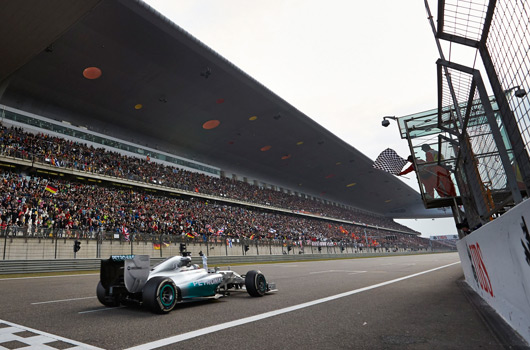While Formula 1 continues to find its way in the new V6 power unit era we’ve heard a lot of moaning about how slow the cars are compared with the normally aspirated and relatively thirsty engines of recent years. Perhaps over a single lap that may be the case, but what about over a full race distance?
The table below compares the total time elapsed for the first four races of 2013 against the same events from 2014. Due to differences in tyre degredation and other possible variables we do acknowledge this is not a foolproof measure to establish the outright speed of the new fuel efficient regime.
We also have to stress that the Chinese Grand Prix was supposed to run for 56 laps, which it did in theory. So the total elapsed time for the full 56 laps is shown below, rather than the 54 lap result which came about due to the chequered flag first being waved on lap 55.
| Location | 2013 | 2014 | Difference |
|---|---|---|---|
| Australia | 1:30:03.225 | 1:32:58.710 | +0:2:25.485 |
| Malaysia | 1:38:56.681 | 1:40:25.974 | +0:1:29.293 |
| Bahrain | 1:36:00.498 | 1:40:25.974 | +0:3:42.245 |
| China | 1:36:26.945 | 1:36:52.810* | +0:0:25.865 |
As you can see, the result in China shows it took Lewis Hamilton around 26 seconds longer to win in the race in 2014 compared with Fernando Alonso’s race winning time from 2013. That’s less than 0.5 seconds per lap slower while using around 33% less fuel. A small price to pay, don’t you agree?
If you compare Lewis’ 2013 result in China—he finished third, 12.3 seconds behind Alonso—the gap to his 2014 result is even closer—around 14 seconds—just 0.25 seconds per lap across the full race distance.
This stat has been highlighted by Joe Saward, who argues the FIA has not been proactive enough to promote this early success of the new world era:
Now that is what I call getting a better bang for your buck. And I’m willing to bet that by the end of the year the gap will have closed more and, perhaps, the races will be run even faster than they were 12 months ago.
So who has highlighted these statistics? Who has told the world that F1 is doing a brilliant job for them? If no-one says this stuff how can the sport to sell the success of its new engine formula? That leaves the way open for the naysayers and the vested interests to promote their negative messages about the sport.
Saward makes a great point. Follow the link below to read his thoughts in full.
[Source: Joe Saward]

5 replies on “26 seconds is all it takes to help save the planet”
Good piece. It should also be pointed out that Merc’s pace is much faster than this as we saw in the closing stages of Malaysia. Arguably if someone was chasing him, Lewis could have ended this race in less time than last year!
I don’t mind the limit on total fuel usage for each race, but I think the fuel flow limit is stupid. It’s stopping the engines from revving over about 12K most of the time, and that for me is spoiling the category.
And it’s worth pointing out that the safety car has had a role in this for the two biggest differences. Australia and Bahrain both had 5 SC laps this year after none last year, and both had a difference of about +3:30 once you factor in Australia being one lap shorter this year.
@Tom – I agree, the total fuel limit for the race is a fair regulation which doesn’t need any help from the fuel flow rule. I think it should be taken further by making this the only major rule regarding the power unit – you can then free up the size, number of cylinders and amount of energy storage.
F1 will not save the planet, even if they went totally electric. It’s an F’n joke and the sport has now become the laughing stock of motor racing. It’s boring, quiet and shit. The cars look like crap and the racing is boring. At least in the past you would go to race or watch it on TV for the spectacle of the sound and speed. Now it’s just pure rubbish and I certainly as have millions of others stopped watching. There will be changes but I hope they don’t come too late. Bring back the mighty sounding V10 & V12 engines. Gee even Formula Renault races with their screaming 3.5L NA V6’s sound better than these tree hugging pieces of crap F1 engines.
Aside from the Mercedes W05 being miles ahead, I think the racing has been been pretty good this year. The sound is not as good I agree, but I’m not as down on F1 as many others seem to be.